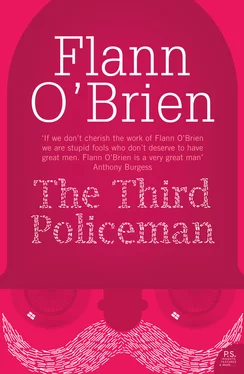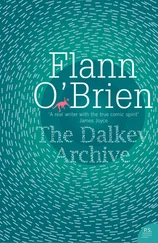I must go back several years to explain what happened to bring about this peculiar situation. The ‘certain party’ whom Divney went to visit once a month was a girl called Pegeen Meers. For my part I had completed my definitive ‘De Selby Index’ wherein the views of all known commentators on every aspect of the savant and his work had been collated. Each of us therefore had a large thing on the mind. One day Divney said to me:
‘That is a powerful book you have written I don’t doubt.’
‘It is useful,’ I admitted, ‘and badly wanted.’ In fact it contained much that was entirely new and proof that many opinions widely held about de Selby and his theories were misconceptions based on misreadings of his works.
‘It might make your name in the world and your golden fortune in copyrights?’
‘It might.’
Then why do you not put it out?’
I explained that money is required to ‘put out’ a book of this kind unless the writer already has a reputation. He gave me a look of sympathy that was not usual with him and sighed.
‘Money is hard to come by these days,’ he said, ‘with the drink trade on its last legs and the land starved away to nothing for the want of artificial manures that can’t be got for love or money owing to the trickery of the Jewmen and the Freemasons.’
I knew that it was not true about the manures. He had already pretended to me that they could not be got because he did not want the trouble of them. After a pause he said:
‘We will have to see what we can do about getting money for your book and indeed I am in need of some myself because you can’t expect a girl to wait until she is too old to wait any longer.’
I did not know whether he meant to bring a wife, if he got one, into the house. If he did and I could not stop him, then I would have to leave. On the other hand if marriage meant that he himself would leave I think I would be very glad of it.
It was some days before he talked on this subject of money again. Then he said:
‘What about old Mathers?’
‘What about him?’
I had never seen the old man but knew all about him. He had spent a long life of fifty years in the cattle trade and now lived in retirement in a big house three miles away. He still did large business through agents and the people said that he carried no less than three thousand pounds with him every time he hobbled to the village to lodge his money. Little as I knew of social proprieties at the time, I would not dream of asking him for assistance.
‘He is worth a packet of potato-meal,’ Divney said.
‘I do not think we should look for charity,’ I answered.
‘I do not think so either,’ he said. He was a proud man in his own way, I thought, and no more was said just then. But after that he took to the habit of putting occasionally into conversations on other subjects some irrelevant remark about our need for money and the amount of it which Mathers carried in his black cash-box; sometimes he would revile the old man, accusing him of being in ‘the artificial manure ring’ or of being dishonest in his business dealings. Once he said something about ‘social justice’ but it was plain to me that he did not properly understand the term.
I do not know exactly how or when it become clear to me that Divney, far from seeking charity, intended to rob Mathers; and I cannot recollect how long it took me to realize that he meant to kill him as well in order to avoid the possibility of being identified as the robber afterwards. I only know that within six months I had come to accept this grim plan as a commonplace of our conversation. Three further months passed before I could bring myself to agree to the proposal and three months more before I openly admitted to Divney that my misgivings were at an end. I cannot recount the tricks and wiles he used to win me to his side. It is sufficient to say that he read portions of my ‘De Selby Index’ (or pretended to) and discussed with me afterwards the serious responsibility of any person who declined by mere reason of personal whim to give the ‘Index’ to the world.
Old Mathers lived alone. Divney knew on what evening and at what deserted stretch of road near his house we would meet him with his box of money. The evening when it came was in the depth of winter; the light was already waning as we sat at our dinner discussing the business we had in hand. Divney said that we should bring our spades tied on the crossbars of our bicycles because this would make us look like men out after rabbits; he would bring his own iron pump in case we should get a slow puncture.
There is little to tell about the murder. The lowering skies seemed to conspire with us, coming down in a shroud of dreary mist to within a few yards of the wet road where we were waiting. Everything was very still with no sound in our ears except the dripping of the trees. Our bicycles were hidden. I was leaning miserably on my spade and Divney, his iron pump under his arm, was smoking his pipe contentedly. The old man was upon us almost before we realized there was anybody near. I could not see him well in the dim light but I could glimpse a spent bloodless face peering from the top of the great black coat which covered him from ear to ankle. Divney went forward at once and pointing back along the road said:
‘Would that be your parcel on the road?’
The old man turned his head to look and received a blow in the back of the neck from Divney’s pump which knocked him clean off his feet and probably smashed his neck-bone. As he collapsed full-length in the mud he did not cry out. Instead I heard him say something softly in a conversational tone – something like ‘I do not care for celery’ or ‘I left my glasses in the scullery’. Then he lay very still. I had been watching the scene rather stupidly, still leaning on my spade. Divney was rummaging savagely at the fallen figure and then stood up. He had a black cash-box in his hand. He waved it in the air and roared at me:
‘Here, wake up! Finish him with the spade!’
I went forward mechanically, swung the spade over my shoulder and smashed the blade of it with all my strength against the protruding chin. I felt and almost heard the fabric of his skull crumple up crisply like an empty eggshell. I do not know how often I struck him after that but I did not stop until I was tired.
I threw the spade down and looked around for Divney. He was nowhere to be seen. I called his name softly but he did not answer. I walked a little bit up the road and called again. I jumped on the rising of a ditch and peered around into the gathering dusk. I called his name once more as loudly as I dared but there was no answer in the stillness. He was gone. He had made off with the box of money, leaving me alone with the dead man and with a spade which was now probably tinging the watery mud around it with a weak pink stain.
My heart stumbled painfully in its beating. A chill of fright ran right through me. If anybody should come, nothing in the world would save me from the gallows. If Divney was with me still to share my guilt, even that would not protect me. Numb with fear I stood for a long time looking at the crumpled heap in the black coat.
Before the old man had come Divney and I had dug a deep hole in the field beside the road, taking care to preserve the sods of grass. Now in a panic I dragged the heavy sodden figure from where it lay and got it with a tremendous effort across the ditch into the field and slumped it down into the hole. Then I rushed back for my spade and started to throw and push the earth back into the hole in a mad blind fury.
The hole was nearly full when I heard steps. Looking round in great dismay I saw the unmistakable shape of Divney making his way carefully across the ditch into the field. When he came up I pointed dumbly to the hole with my spade. Without a word he went to where our bicycles were, came back with his own spade and worked steadily with me until the task was finished. We did everything possible to hide any trace of what had happened. Then we cleaned our boots with grass, tied the spades and walked home. A few people who came against us on the road bade us good evening in the dark. I am sure they took us for two tired labourers making for home after a hard day’s work. They were not far wrong.
Читать дальше






![О Генри - Бляха полицейского О’Руна [The Badge of Policeman O'Roon]](/books/405347/o-genri-blyaha-policejskogo-o-runa-the-badge-of-po-thumb.webp)





